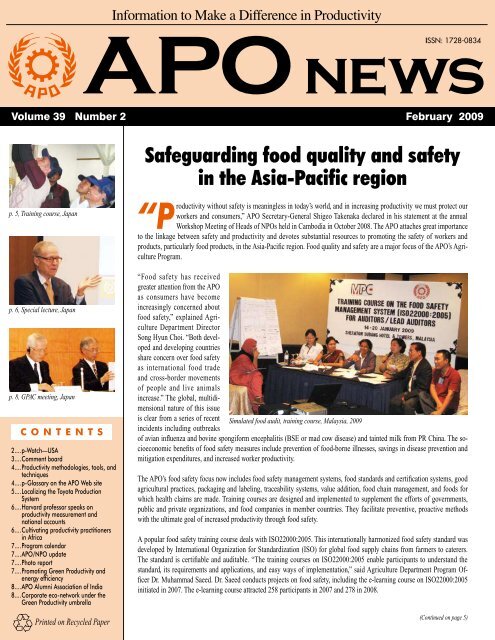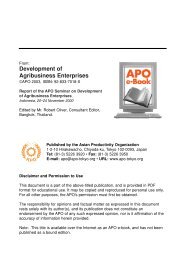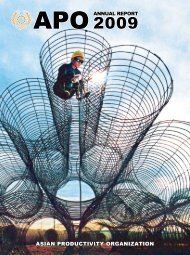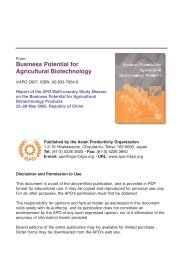February 2009 - Asian Productivity Organization
February 2009 - Asian Productivity Organization
February 2009 - Asian Productivity Organization
You also want an ePaper? Increase the reach of your titles
YUMPU automatically turns print PDFs into web optimized ePapers that Google loves.
C O N T E N T S<br />
2....p-Watch—USA<br />
3....Comment board<br />
4....<strong>Productivity</strong> methodologies, tools, and<br />
techniques<br />
4....p-Glossary on the APO Web site<br />
5....Localizing the Toyota Production<br />
System<br />
6....Harvard professor speaks on<br />
productivity measurement and<br />
national accounts<br />
6....Cultivating productivity practitioners<br />
in Africa<br />
7....Program calendar<br />
7....APO/NPO update<br />
7....Photo report<br />
7....Promoting Green <strong>Productivity</strong> and<br />
energy efficiency<br />
8....APO Alumni Association of India<br />
8....Corporate eco-network under the<br />
Green <strong>Productivity</strong> umbrella<br />
Information to Make a Difference in <strong>Productivity</strong><br />
APO news<br />
Volume 39 Number 2 <strong>February</strong> <strong>2009</strong><br />
p. 5, Training course, Japan<br />
p. 6, Special lecture, Japan<br />
p. 8, GPAC meeting, Japan<br />
Printed on Recycled Paper<br />
Safeguarding food quality and safety<br />
in the Asia-Pacific region<br />
without safety is meaningless in today’s world, and in increasing productivity we must protect our<br />
workers and consumers,” APO Secretary-General Shigeo Takenaka declared in his statement at the annual<br />
“<strong>Productivity</strong><br />
Workshop Meeting of Heads of NPOs held in Cambodia in October 2008. The APO attaches great importance<br />
to the linkage between safety and productivity and devotes substantial resources to promoting the safety of workers and<br />
products, particularly food products, in the Asia-Pacific region. Food quality and safety are a major focus of the APO’s Agriculture<br />
Program.<br />
“Food safety has received<br />
greater attention from the APO<br />
as consumers have become<br />
increasingly concerned about<br />
food safety,” explained Agriculture<br />
Department Director<br />
Song Hyun Choi. “Both developed<br />
and developing countries<br />
share concern over food safety<br />
as international food trade<br />
and cross-border movements<br />
of people and live animals<br />
increase.” The global, multidimensional<br />
nature of this issue<br />
is clear from a series of recent Simulated food audit, training course, Malaysia, <strong>2009</strong><br />
incidents including outbreaks<br />
of avian influenza and bovine spongiform encephalitis (BSE or mad cow disease) and tainted milk from PR China. The socioeconomic<br />
benefits of food safety measures include prevention of food-borne illnesses, savings in disease prevention and<br />
mitigation expenditures, and increased worker productivity.<br />
The APO’s food safety focus now includes food safety management systems, food standards and certification systems, good<br />
agricultural practices, packaging and labeling, traceability systems, value addition, food chain management, and foods for<br />
which health claims are made. Training courses are designed and implemented to supplement the efforts of governments,<br />
public and private organizations, and food companies in member countries. They facilitate preventive, proactive methods<br />
with the ultimate goal of increased productivity through food safety.<br />
A popular food safety training course deals with ISO22000:2005. This internationally harmonized food safety standard was<br />
developed by International <strong>Organization</strong> for Standardization (ISO) for global food supply chains from farmers to caterers.<br />
The standard is certifiable and auditable. “The training courses on ISO22000:2005 enable participants to understand the<br />
standard, its requirements and applications, and easy ways of implementation,” said Agriculture Department Program Officer<br />
Dr. Muhammad Saeed. Dr. Saeed conducts projects on food safety, including the e-learning course on ISO22000:2005<br />
initiated in 2007. The e-learning course attracted 258 participants in 2007 and 278 in 2008.<br />
(Continued on page 5)
















